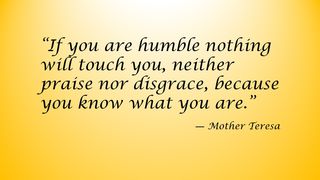Philosophy
Humility: What Can It Do for You?
Is humility a sense of weakness that should be avoided, or is there more to it?
Posted April 27, 2020

I made a new friend recently: Dr. Kari Konkola. He has a doctoral degree in history and has spent a long time examining what are called Confessors' Manuals, which are medieval Latin texts by Christian pastors who reflect on their encounters with people who were struggling to become better persons.
As Dr. Konkola related to me, none of these Latin texts have been translated into English even though they are rich in psychological case studies of how people heal from excessive pride or self-admiration, self-doubt, and guilt. A key theme cutting across the manuals is this: As people know they are imperfect, clearly acknowledge this, and practice humility, they become happier. Humility was an important pathway to healing. Yet, as Dr. Konkola further explained to me, modern sensibilities have suppressed the theme of humility, even in houses of worship. The message that we all are imperfect, that we all fall short of our deeper humanity, is virtually absent.
So, I put Dr. Kankola's ideas of the rarity of studies in humility to the test and started to examine social scientific research centered on the moral virtue of humility, and I found that he is correct. For example, Tangney (2002) in examining all of the research on humility to that point in the social sciences, lamented that such research is very rare.
Even when humility was researched, it was taking a backseat in people who were asked to say what positive psychological themes led to their life satisfaction. For example, in a 2004 literature review, John Harvey and Brian Pauwels, discussing others' psychological research of the day, reported this: When it comes to life satisfaction, middle-aged adults endorsed themes of hope and gratitude as contributing to the good life. Humility, generally defined as not thinking more highly of the self than is true, was not connected with feelings of satisfaction in life.
The negative view of humility within philosophy has been with us for centuries, with the writings of the Scottish philosopher David Hume and the German philosopher Friedrich Nietzsche. For example, in the late 1800s, Nietzsche stated that those who try to humble themselves are actually trying to exalt the self. The famous philosophers Albert Camus and John Paul Sartre, in post-World War II France, split over the theme of humility. Whereas Camus embraced moral humility, rejected absolutism and violence, and acknowledged human fallibility, Sartre was not convinced (Dresser, 2017).
So, not only has the prominence of humility as a way of growing in character faded from the Middle Ages, it has become unpopular. Yet, does humility deserve such a lowly status in philosophy, in psychology, and even in some houses of worship?
The point of this essay is to examine whether there is philosophical and psychological evidence to bring humility back to a higher place. Let us start as Socrates used to do when examining a new moral theme by asking: What is it?
Defining Humility: What Is It?
Although Aristotle did not explicitly use the word humility, philosophers following in the Aristotelian tradition have seen humility as a moral virtue between the vices of dogmatism or arrogance on the one hand and timidity or moral weakness on the other (Hazlett, 2012). In other words, humility is a quest for truth about the self and others that avoids extremes.
The 18th century philosopher David Hume, mentioned above, referred to it as a "monkish" attribute of the weak. It seems that Hume and others who see humility as a synonym for the vice of timidity are committing the philosophical error of equating it with one of the extreme vices surrounding its deeper definition when we view this moral virtue from an Aristotelian lens.
For the medieval philosopher, Bernard of Clairvaux, there are two stages of humility: one negative and the other positive. Negative humility starts with the realization that one has fallen, has sinned, and there appears to be no way out through one's own efforts alone. This makes one more open to God's grace.
Positive humility occurs when people transcend their own self-importance and embrace the truth, goodness, and beauty of God. This keeps one humble by embracing the truth that the self is not the center of the universe and yet is loved (Campbell, 2019).
Thomas Aquinas, also a medieval philosopher, agrees. Humility is a high moral virtue because, in one's own imperfections and sins, the person becomes open to the transcendent, to that which is grander and more powerful than the self. In other words, people of humility know they are sinners and at the same time are made in the image and likeness of God. Thus, there is the avoidance of the Aristotelian extremes of both arrogance and or false self-condemnation once the reality of sin in one's life is understood and accepted as real.
Humility within modern philosophy, as pointed out in the Stanford Encyclopedia of Philosophy, often takes what is called a strong account of oneself. In other words, with humility, one has a check against seeing oneself as too lowly. Humility also is a corrective for too exalted a view of the self (Bommarito, 2018). As Roberts and Cleveland (2016) instruct, humility is contrasted with the vice of pride or the motivation, as an end in and of itself, to be better than others.
Humility in their view is a kind of legitimate lack of concern for self-importance. This does not mean that one is uninterested, for example, in doing excellent work. Instead, it means that creating excellent work or being good in a relationship is more important than getting an award for the work or high praise for being a good spouse or parent.
Humility is not humiliation or being put down and shamed by others. Humility is not making oneself a moral worm, which would be one of the Aristotelian imbalances. Humility is seeing the truth about oneself so that pride or narcissism does not dominate.

It thus is a view of the self as mortal and therefore imperfect, yet capable of higher moral accomplishment, without putting oneself first or being dominated by pride. It makes a person open to new ideas, to defending who people, in general, are without condemnation of the human condition (or the self) or making people little deities (or the self into such a deity). There is much more to say here because philosophers are beginning to awaken to the importance of this construct as seen in an entire book of 41 chapters to be released soon in July 2020, The Handbook of Philosophy of Humility (Alfano, Lynch, & Tanesisi, 2020), and by a book with 23 chapters dedicated to its exploration in philosophy and the social sciences: the Handbook of Humility (Worthington, Davis, & Hook, 2016).
Can Humility Help You?
Here are some empirical findings from the social sciences for you to consider:
1. Humility may help you have more positive emotions. In a study of 127 undergraduates, the participants statistically reported a statistically significant association between the practice of humility and the feelings of positive emotions (Exline & Geyer, 2011).
2. Humility may help you to forgive yourself when you have broken your own standards. In a study of 194 participants, those who had the stronger humility were more likely to drop excessive defensiveness regarding the objectionable behavior and to forgive the self (Onody, Woodyatt, Wenzel, Cibich, Sheldon, & Cornish, 2020).
3. As you take an honest inventory of your own legitimate shortcomings, this can increase your positive feelings toward others and decrease aggression. These findings, although complex and not always found, is reported in a literature review by Ruberton, Kruse, & Lyubomirsky, 2016).
4. If you see humility in others, this may strengthen your alliance with that person. In a study of the client and counselor relationship, those clients who perceived what is called "cultural humility" in the counselor were able to forge a stronger bond with the mental health professional (Hook, Davis, Owen, Worthington, & Utsey, 2013).
Recommendations If You Want to Try Humility
1. It is important first to have an accurate definition of humility. I recommend the Aristotelian approach by first seeing that the vice of moral weakness or timidity can be mistaken for true humility. Avoid that, as researchers should as well when asking participants to judge the worth of humility in their lives.
2. Do not grow weary when you see a vast array of definitions of humility in the published literature. Most who write on the topic are not philosophers, particularly Aristotelian philosophers. Scrutinize the published definitions for both clarity and error. Do not accept a definition just because it is in print.
3. Try to practice humility as a way of reducing anger before considering forgiveness toward someone who has been deeply unfair to you. As Dr. Konkola hypothesizes, it is difficult to forgive when filled with the vice of pride and deep anger. Humility may be a gateway to accepting forgiving as an option and as a deeper way of forgiving.
4. Try practicing little acts of humility each day. An example would be this: Try not to dominate others even if your role in your job is to have power over others.
The practice of humility, although not a popular moral virtue right now in the West, might be a pathway to overcoming anger and leading a more satisfying life.
References
Alfano, M., Lynch, M.P., & Tanesini, A. (in press, 2020). Handbook of philosophy of humility. New York: Routledge.
Bommarito, N. (2018). Modesty and humility. Stanford Encyclopedia of Philosophy. https://sjvlaydivision.org/virtue-of-humility/
Campbell, D. (2019). The virtue of humility. St. John Vianney Theological Seminary. https://sjvlaydivision.org/virtue-of-humility/
Dresser, S. (2017). How Camus and Sartre split up over the question of how to be free. Aeon, January 27, https://aeon.co/ideas/how-camus-and-sartre-split-up-over-the-question-o…
Exline, J.J. & Geyer, A.L. (2011). Perceptions of humility: Preliminary studies. Self and Identity. https://doi.org/10.1080/13576500342000077
Harvey, J.H. & Pauwels, B.G. (2004). Modesty, humility, character strength, and positive psychology. Journal of Social and Clinical Psychology, 23, 620-623.
Hazlett, A. (2012). Higher-order epistemic attitudes and intellectual humility. Episteme, 9, 205–223.
Hook, J. N., Davis, D. E., Owen, J., Worthington, E. L., Jr., & Utsey, S. O. (2013). Cultural humility: Measuring openness to culturally diverse clients. Journal of Counseling Psychology, 60(3), 353–366. https://doi.org/10.1037/a0032595
Onody, A.P., Woodyatt, L., Wenzel, M., Cibich, M., Sheldon,A., & Cornish, M.A. (2020). Humility and its relationship to self-condemnation, defensiveness and self-forgiveness following interpersonal transgressions. Journal of Psychology and Theology, https://doi.org/10.1177/0091647120911111
Ruberton, P. M., Kruse, E., & Lyubomirsky, S. (2016). Boosting state humility via gratitude, self-affirmation, and awe: Theoretical and empirical perspectives. To appear in E. Worthington, D. Davis, & J. Hook (Eds.), Handbook of humility. New York: Routledge.
Tangney, J.P. (2002). Humility. In S.J. Lopez and C.R. Snyder (Eds.), Handbook of positive psychology. Oxford, UK: Oxford University Press (pp.411-419).
Worthington, E., L., Davis, D.E., & Hook, J.N. (2016). Handbook of humility. New York: Routledge.




